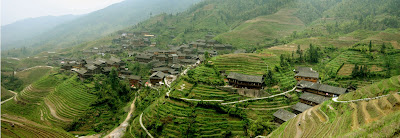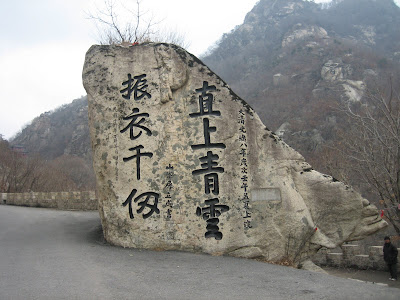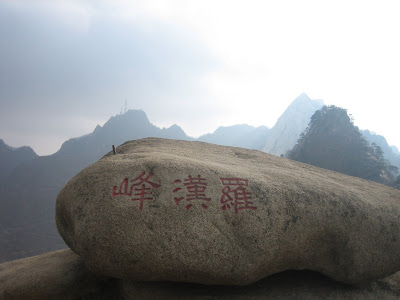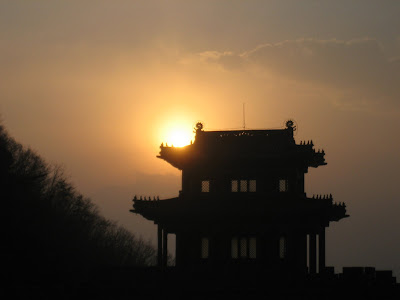Guilin, one of the most beautiful scenic areas of China, is known for its mountains and rivers. For the week of Labor Day, Alain and I hopped on a plane from Shenyang, and found ourselves in a humid and hot climate at a little airport in the city of Guilin. On our itinerary: Guilin, Yangshuo, and Longji.
The first night in Guilin, we took a walk in the park. The area in chinese is called "Lian Jiang Si Hu", meaning two rivers and four lakes. There, we came across traditional style towers that are now converted into tea houses, light and water shows, and many walkways along the river.
Teahouses in Guilin

Fresh coconuts on the street

The next morning, we took a 4 hour boat cruise down the Li River to travel from Guilin to Yangshuo. The section of the Li River is one of the most sections. We carried my miniature-sized Clemson umbrella up to the upper deck and braved the rain and fog, in hopes of seeing the mountains that were so famous.
Fog on the Li River

After landing in Yangshuo, we walked through a fake market and came upon our guesthouse, that cost us only 60 yuan per night (9 USD!). The same night, we went to the famed light show, directed by Zhang Yimou (director of Crouching Tiger, Hidden Dragon, and House of Flying Daggers). The view was amazing. We sat on a stage overlooking the river, with mountains in the background, where more than 600 actors put together a show about the local life in the region.

The next day, we rented bicycles for 20 yuan each, and rode into the small villages along the river. Along the way, we saw many water buffalo and rice fields. We ended the night by watching comorants fishing. The comorants lead the fishermen in their rafts, and swoop into the water to catch fish.
Rafting on the Li River

A farmer and his water buffalo outside a small village. He told us that the buffalo cost him 5000 yuan.

Village outside of Yangshuo
 Fisherman and his comorants
Fisherman and his comorants

On our third day, we kayaked along the Li River, to make up for the rained out cruise.
View from the Kayak
We wrapped up our visit in Yangshuo by shopping in the fake market, where I bought some jewelry, a watch, and art, and where Alain bought an entirely new wardrobe of fake polo shirts, a polo jacket, a timberland belt, and fake Levi's and Diesels (because we can't find european sizes in Shenyang).
Fake Market and Mulitudes of Lao Wai (foreigners)

Early the next morning, we took a bus that took us north of Yangshuo and Guilin, into the Longji Rice Terrace and the Ping An minority village, where the Yao minorities live. The women of the village have the World's longest hair (seriously, according to the Guiness Book of World Records), because they only cut it once around 16 years old. After that, they put their hair on top of their heads. We were also told that it is custom for the girls to pinch the guys' butts that they are interested in.
Hong Yao Women
 After we hiked up the terrraces, we enjoyed a meal of bamboo steamed rice and chicken, before heading to the terrace.
After we hiked up the terrraces, we enjoyed a meal of bamboo steamed rice and chicken, before heading to the terrace.
Bamboo Lunch
Clouds coming in on the 9 Dragon 5 Tiger Terraces (We couldn't find the tigers, but there were 9 ridges that were name the 9 dragons.)

Ping An Village and the location of our hotel

I'd always wanted to go to Guilin, because of a song I'd heard my parents play when I was young. The lyrics go something like this:
Wo xian qu Guilin, ya/Wo xian qu Guilin/Ke shi you le shi jian wo que mei you qian.
Which means: I want to go to Guilin, ya/ I want to go to Guilin/ But when I have time, I don't have money.
So I'm grateful to have taken this trip, as many Chinese do not have the opportunity to see it within their lifetime.
 For many younger Chinese, learning to speak English is an important personal goal, because it opens doors to jobs in multinational companies and is thus often linked with one's status in Chinese society. Today, many parents regard it as a vital life skill for their children; there are English classes for British English, American English, and even English classes for parents to enroll their babies and toddlers. Many Chinese spend their educational careers studying English. However, English is drastically different from Chinese, and there are few opportunities for Chinese to interact with those who are truly fluent in English. Therefore, due to both the importance of English and the lack of fluent speakers, the improper use of the English language and grammer runs rampant across the country. Fine specimens of Chinglish are exemplified across the country, on street signs, public reminders, and restaurant and shop fronts throughout giving those of us who know English a good laugh or an insight to the Chinese culture or language. Below are a few examples from my travels:
For many younger Chinese, learning to speak English is an important personal goal, because it opens doors to jobs in multinational companies and is thus often linked with one's status in Chinese society. Today, many parents regard it as a vital life skill for their children; there are English classes for British English, American English, and even English classes for parents to enroll their babies and toddlers. Many Chinese spend their educational careers studying English. However, English is drastically different from Chinese, and there are few opportunities for Chinese to interact with those who are truly fluent in English. Therefore, due to both the importance of English and the lack of fluent speakers, the improper use of the English language and grammer runs rampant across the country. Fine specimens of Chinglish are exemplified across the country, on street signs, public reminders, and restaurant and shop fronts throughout giving those of us who know English a good laugh or an insight to the Chinese culture or language. Below are a few examples from my travels: 


















 The view was indescribable. It was an incredible feel
The view was indescribable. It was an incredible feel ing to look around, and see the mountains surrounding us and below us. It was 5 PM by the time we’d climbed all 5 peaks, and began our descent down.
ing to look around, and see the mountains surrounding us and below us. It was 5 PM by the time we’d climbed all 5 peaks, and began our descent down. Thoroughly exhausted, we were disappointed to find that we again didn’t have seats, and we had to walk 6 cars to the dining room, where we paid, were served cold food, and fell asleep. Suddenly someone was yelling at me to get up, and get out, because there were other paying customers who wanted to eat. Alain and I stood the remainder of the time, about 30 minutes, found a taxi after many tries, and rested our tired, sore, and limping legs.
Thoroughly exhausted, we were disappointed to find that we again didn’t have seats, and we had to walk 6 cars to the dining room, where we paid, were served cold food, and fell asleep. Suddenly someone was yelling at me to get up, and get out, because there were other paying customers who wanted to eat. Alain and I stood the remainder of the time, about 30 minutes, found a taxi after many tries, and rested our tired, sore, and limping legs.






 (I didn't take a picture, but the green uniforms and face expressions are pretty representative...)
(I didn't take a picture, but the green uniforms and face expressions are pretty representative...)





 Fisherman and his comorants
Fisherman and his comorants


 After we hiked up the terrraces, we enjoyed a meal of bamboo steamed rice and chicken, before heading to the terrace.
After we hiked up the terrraces, we enjoyed a meal of bamboo steamed rice and chicken, before heading to the terrace.
 Ping An Village and the location of our hotel
Ping An Village and the location of our hotel


 (This wasn't our bus - the bus is in the background. This could have been our ride up into the mountain though...)
(This wasn't our bus - the bus is in the background. This could have been our ride up into the mountain though...)





